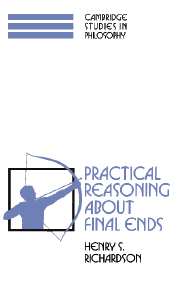
-
Select format
-
- Publisher:
- Cambridge University Press
- Publication date:
- June 2012
- November 1994
- ISBN:
- 9781139174275
- 9780521464727
- 9780521574426
- Dimensions:
- (216 x 138 mm)
- Weight & Pages:
- 0.52kg, 344 Pages
- Dimensions:
- (216 x 138 mm)
- Weight & Pages:
- 0.442kg, 344 Pages
- Subjects:
- Philosophy: General Interest, Logic, Philosophy
- Series:
- Cambridge Studies in Philosophy
You may already have access via personal or institutional login- Subjects:
- Philosophy: General Interest, Logic, Philosophy
- Series:
- Cambridge Studies in Philosophy
Book description
Henry Richardson argues that we can determine our ends rationally. He constructs a rich and original theory of how we can reason about our final goals. Richardson defuses the counter-arguments for the limits of rational deliberation, and develops interesting ideas about how his model might be extended to interpersonal deliberation of ends, taking him to the borders of political theory. Along the way Richardson offers illuminating discussions of, inter alia, Aristotle, Aquinas, Sidgwick, and Dewey, as well as the work of several contemporary philosophers.
Reviews
‘This profound and important book challenges a common assumption about rationality: that all rational deliberation involves the selection of instrumental means to ends that are set by some non-rational process, for example by desires that are themselves impervious to reasoning. Drawing resourcefully on arguments of Aristotle and Plato, Richardson constructs an impressive account of the rationality involved in our selection and modification of our ultimate ends, and particularly of the ways in which a vague end can be more and more adequately specified by reflection. In the process, he offers the best account I have seen of the arguments for and against the claim that all values can be measured by a single common metric.’
Martha Nussbaum - University of Chicago Law School
Contents
Metrics
Altmetric attention score
Full text views
Full text views help Loading metrics...
Loading metrics...
* Views captured on Cambridge Core between #date#. This data will be updated every 24 hours.
Usage data cannot currently be displayed.
Accessibility standard: Unknown
Why this information is here
This section outlines the accessibility features of this content - including support for screen readers, full keyboard navigation and high-contrast display options. This may not be relevant for you.
Accessibility Information
Accessibility compliance for the PDF of this book is currently unknown and may be updated in the future.


